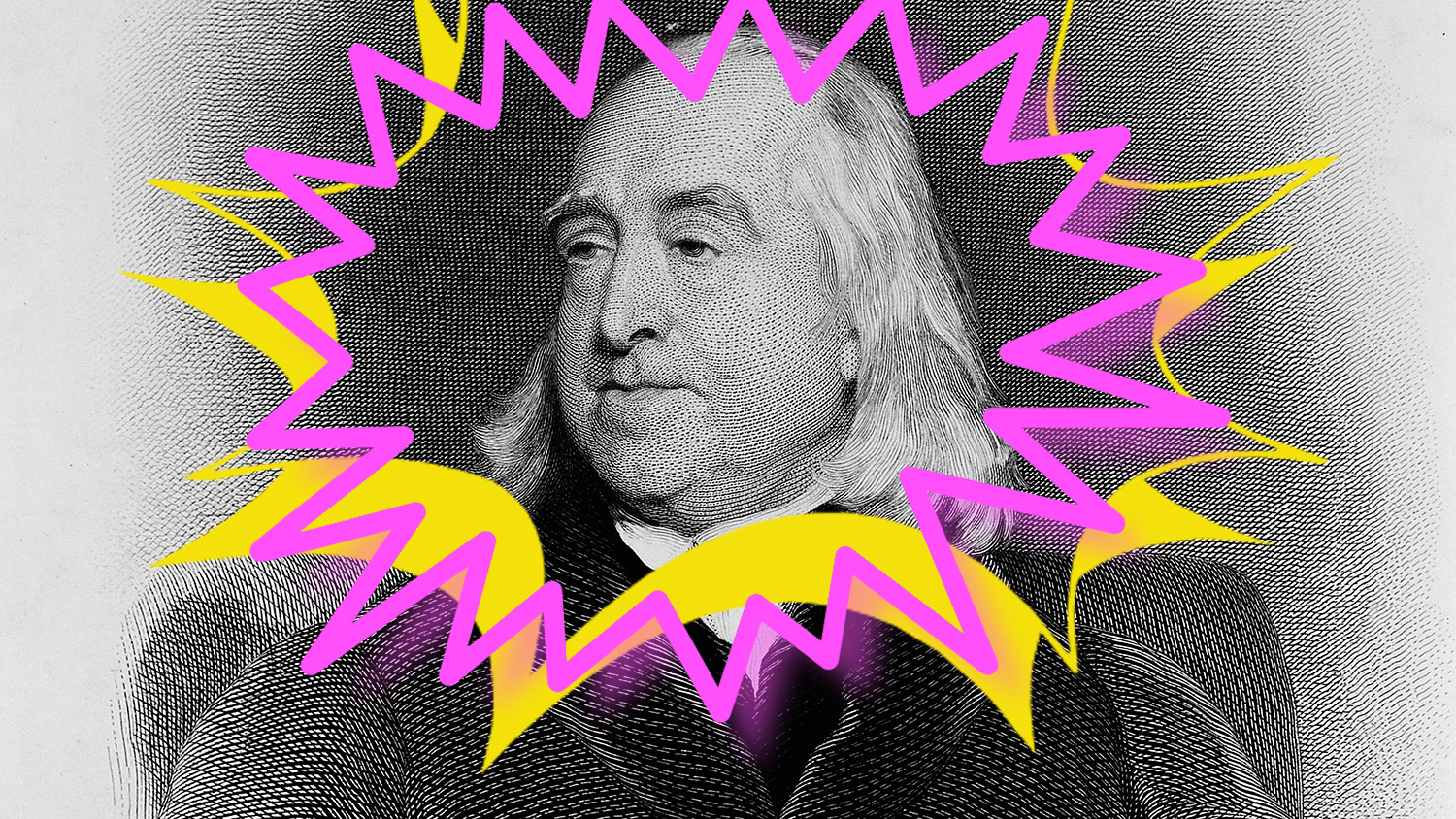Thought experiment: Would a perfectly engineered pleasure pill really make us happy?

Credit: Digital Vision Lab / Adobe Stock
- English philosopher Jeremy Bentham is the founder of utilitarianism, which can be summarized as “pleasure is good.”
- Contemporary views equating the pursuit of pleasure with the so-called “good life” echo Benthamite ideas.
- Reflecting on utilitarian notions can help us understand the true meaning of happiness.
It was the summer of 1822, and Jeremy Bentham (1748-1832) wanted the enlightened governments of the world to know he was available. If anyone was looking to adopt the most cutting-edge, logically coherent, philosophically robust constitution known to humankind, he was their guy. And he had the letters of recommendation to prove it.
To get the word out, Bentham wrote the delightfully titled “Codification Proposal, Addressed by Jeremy Bentham to All Nations Professing Liberal Opinions; or, Idea of a Proposed All-Comprehensive Body of Law, with an Accompaniment of Reasons.” That might sound like the title of a crackpot’s collection of ravings, but Bentham was a serious thinker — one of the most highly respected intellectuals of his day — with a serious project.
By the time he published “Codification Proposal” at age 74, he had gained a reputation as a leading social reformer (anti slavery, anti death penalty, for the legal equality of women) and had laid out his views in a number of highly regarded books and articles.
Bentham’s philosophy is known as utilitarianism. It gained a massive following, especially in the English-speaking world, and it remains deeply influential today. They may not know it, but just about every TV pundit talking about the economy just assumes that utilitarianism is true. It’s the philosophy behind their whole growth-maximizing agenda. It’s the philosophy that gives some weighty intellectual credentials to our popular take on how the good life feels.
A simple principle is at the heart of Bentham’s utilitarianism: “Good is pleasure or exemption from pain. . . . Evil is pain or loss of pleasure.” Translating out of his nineteenth-century English: Pleasure is good. So things that lead to pleasure are good. And things that cause us to lose it are bad. Also, pain is bad. So things that lead to pain are bad. And things that cause us to avoid it are good. Nothing else is good. Nothing else is bad.
Moreover, pleasure is just pleasure. This idea opposed a well-worn cultural prejudice of Bentham’s day. He came from a wealthy family in a notoriously snobby culture. Most of his peers considered it obvious that some pleasures were “higher” than others. Poetry, orchestral music, painting, ornamental gardening (really)—all these more “intellectual” and “refined” arts—were considered better than the vulgar delights of the masses. Bentham cried foul. “Prejudice apart,” he said, “the game of push-pin is of equal value with the arts and sciences of music and poetry.” If anything, silly bar games like push-pin have probably made more people happier than poetry ever has. This was like telling a film connoisseur that Batman v Superman: Dawn of Justice (Rotten Tomatoes audience score 63% and critic score 29%; $874 million box office draw worldwide) is more valuable than the Coen brothers’ Hail, Caesar! (Rotten Tomatoes audience score 44% and critic score 86%; $64 million box office draw worldwide). Critics’ assessments don’t matter. What matters is the total amount of pleasure all the viewers combined get from watching a movie. For Bentham, a pleasure is a pleasure is a pleasure. Call this the “push-pin principle.”
Is the good feeling alone what’s worth wanting? Or are the really worthwhile good feelings ones that are about something good?
This all tracks closely with common contemporary views about how a good life feels. What makes a feeling good? The experience of pleasure. Who is the judge? Whoever is having the experience. The more pleasurable experiences someone has and the longer they have them, the better their life is. Bentham offers a simple calculus for determining how good an action would be: the more intense and long-lasting the pleasure it gives, the better the action. He throws in bonus points for actions that yield pleasure sooner rather than later, that are more certain to yield the pleasure they promise, that are likely to produce future pleasures after their immediate effect, and that are unlikely to produce future pains.
The basic utilitarian approach is elegantly simple. It reduces all possible goods to one: the experience of pleasure. What matters is how much of this you can get. The question of the good life is one of arithmetic. All goods can be added together, and all bads subtracted. The whole trick, whether you’re an individual or a whole country looking for a new constitution, is then to set things up so that you maximize the sum. Bentham called this the “greatest happiness principle”: do whatever leads to the most happiness.
How does the good life feel? For Bentham, as for many people today, it feels good. It’s a life of pleasure, with a minimum of pain. Where the pleasure comes from is different for different people.
The strong version of the push-pin principle says it doesn’t matter at all what the pleasure is about. It doesn’t matter if it’s even about anything at all. If there were a drug that could make you feel amazingly, astonishingly great for no reason, without any negative consequences, that would be just as good as the joy of meeting your child for the first time. Or let’s say the drug could reliably make you feel good over the long haul, no matter what. So regardless of whether you lose your job or your friends betray your deepest trust or your child is never going to speak to you again or a dear friend loses a loved one, you feel splendid. You feel precisely how the good life feels. If you really buy the push-pin principle, you can’t object.
So take a good hard look at pleasure and ask if that’s really what you’re after. Is the good feeling alone what’s worth wanting? Or are the really worthwhile good feelings ones that are about something good? Would a perfectly chemically engineered high really equal the rush of a long-awaited first kiss, the satisfaction of having completed an important mission, or the quiet joy of cradling a sleeping infant?





